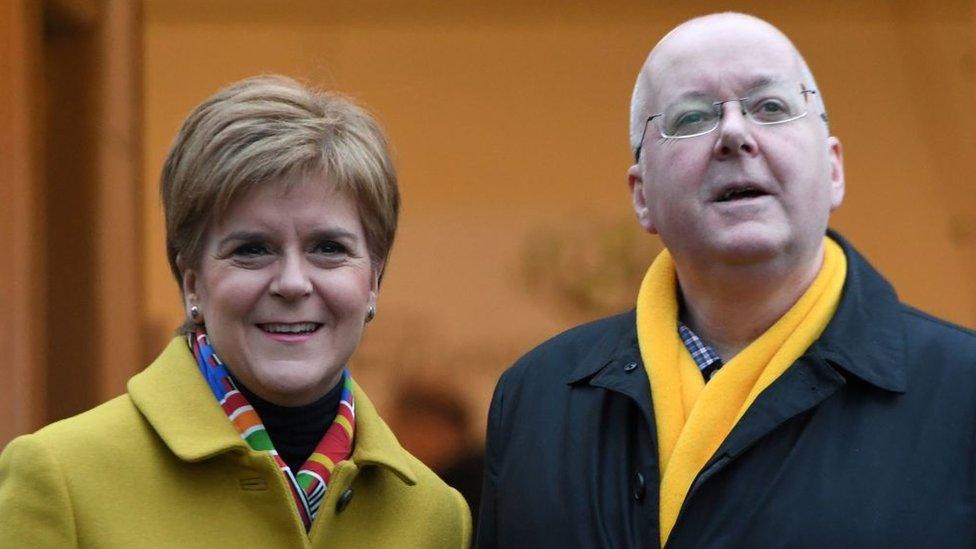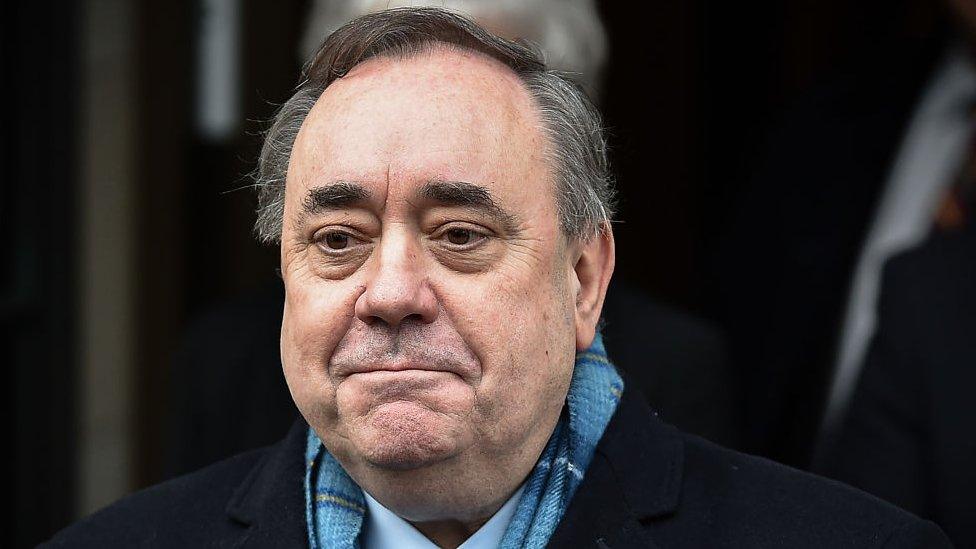MSPs bid to recall SNP chief Peter Murrell to Salmond inquiry
- Published

Mr Murrell and Ms Sturgeon have been married since 2010
Members of the Alex Salmond inquiry want to recall the SNP's chief executive over apparent "inconsistencies" in his evidence.
Peter Murrell, the husband of First Minister Nicola Sturgeon, denied plotting against Mr Salmond when he appeared before the inquiry on Tuesday.
But opposition MSPs believe that Mr Murrell contradicted himself, and Ms Sturgeon, over some of the details.
They have called on him to appear again to answer more questions.
The move largely centres on a meeting Ms Sturgeon had with Mr Salmond in the Glasgow home she shares with Mr Murrell.
Ms Sturgeon has said the meeting in April 2018 was the first time she learned the detail of harassment complaints against Mr Salmond, who preceded her as SNP leader and first minister.
Opposition MSPs believe Mr Murrell gave contradictory answers to some of their questions about the meeting in his evidence to them on Tuesday.
They say he first claimed not to know about the meeting beforehand, before later suggesting that he had known the day before.
And they claim that Mr Murrell also appeared to say he was not at home for the meeting, but then said he had returned home while it was ongoing.
The SNP chief also said he had not asked Ms Sturgeon about the meeting because it was Scottish government business - yet Ms Sturgeon has previously insisted she was acting in her capacity as party leader rather than as first minister.
Mr Murrell said that prior to the first meeting, Ms Sturgeon "thought it was a party matter", but that it then became clear that it was "a Scottish government matter".
And he said he did not accept that this contradicted Ms Sturgeon's previous statements.
This point is particularly important, Ms Sturgeon's opponents believe, because government meetings should be recorded in her diary and official notes should be taken - which did not happen.
They argue that this suggests the first minister may have misled parliament and breached the ministerial code over her dealings with Mr Salmond - for which Ms Sturgeon would be expected to resign.

The inquiry is examining the Scottish government's botched handling of harassment complaints against Mr Salmond
Questions have also been raised about Mr Murrell's insistence that he does not use WhatsApp - despite claims that he appears to have used the messaging service as recently as last month, external.
However, in a letter to the committee on Wednesday, Mr Murrell said: "I do not use WhatsApp. There are several messaging apps on my phone that I don't use.
"I use my phone to make calls and to send emails and texts. Twitter is the only social media platform I'm active on."
Scottish Conservative MSP Murdo Fraser, who is a member of the inquiry committee, described the evidence given by Mr Murrell on Tuesday as "shambolic" and "sleekit".
Mr Fraser added: "He tied himself in knots answering the simplest of questions and spoke in riddles.
"The SNP chief executive must return to the committee to clear up the contradictions in his evidence and this time, provide entirely truthful answers."
His call has been echoed by other opposition members of the committee, with Labour's Jackie Baillie saying Mr Murrell "must explain the contradictions and discrepancies in his evidence to the committee yesterday as a matter of urgency."
'Squirming performance'
She said: "Mr Murrell's squirming performance has cast doubt over the first minister's account of what happened, and poses a serious question over whether Nicola Sturgeon breached the Ministerial Code by having a clandestine meeting with Alex Salmond."
Scottish Liberal Democrat MSP Alex Cole-Hamilton said he had written to the committee's clerks about the "significant doubt" created by parts of Mr Murrell's evidence.
He said: "If Peter Murrell thinks that half-truths and untruths will convince the committee to give up its inquiries, he is dead wrong."
The Holyrood inquiry was set up to review the government's handling of internal complaints against Mr Salmond after he successfully raised a legal challenge against its investigation processes.
The government was forced to pay the former first minister more than £500,000 in legal expenses after it conceded its approach had been "unlawful" due to a procedural flaw.
Mr Salmond was later cleared of 13 sexual assault charges after a trial at the High Court in Edinburgh.
The committee is now reaching its final hearings, with both Mr Salmond and Ms Sturgeon due to give evidence in the coming weeks - although members have repeatedly complained that their work is being hindered by "obstruction" and "obfuscation" by key players.